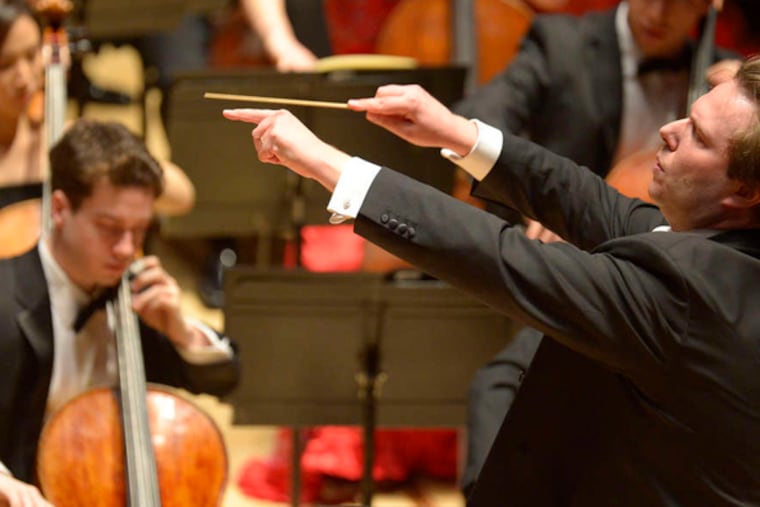Curtis orchestra in a celebratory mood
Sometimes a thank-you note just won't do. And so the Curtis Institute of Music dedicated Sunday night's Curtis Symphony Orchestra concert in Verizon Hall to Marguerite and H.F. "Gerry" Lenfest, whose philanthropic support of the school has eclipsed all before it.

Sometimes a thank-you note just won't do. And so the Curtis Institute of Music dedicated Sunday night's Curtis Symphony Orchestra concert in Verizon Hall to Marguerite and H.F. "Gerry" Lenfest, whose philanthropic support of the school has eclipsed all before it.
Having the orchestra do the honors was apt, since it was Gerry Lenfest, who is part-owner of the company that publishes The Inquirer and who is stepping down as board chair June 1, who ended Curtis' decades-old search for a proper orchestra rehearsal hall by rolling up his sleeves and building one. (The concert and gala earlier in the evening raised at least $830,000, before expenses, for Curtis' student assistance program.)
You could read symbolism into the offerings - celebration in Fireworks, written by Stravinsky as a wedding gift, and the opaque mysteries of a successful duo partnership in Penderecki's neo-Romantic Concerto doppio for Violin, Viola, and Orchestra.
Programmatic echoes stopped at Tchaikovsky's Symphony No. 6, whose meaning the composer never made clear. Conductor Ignat Solzhenitsyn was determined to make it a personal statement, however. His was an overwrought view of the piece, one that often failed to show the orchestra at its best. After years of having David Hayes prepare the Curtis orchestra before the guest conductor arrives, Curtis is now using conducting fellow Kensho Watanabe. Watanabe led a crisp account of the Stravinsky, and while it's impossible to discern what his counsel was in Tchaikovsky rehearsals, it must be said there was an occasional bout of struggle in this performance. Unreserved energy and a big sound were there, some of the polish not. Solzhenitsyn's over-the-top rubato introduced an enervating element, particularly in the last movement, where he whipped up phrasing right away rather than building tension over a long view.
Solzhenitsyn presided over a greater sense of order in Penderecki's stunning double concerto from 2012. Curtis president Roberto Díaz and 1991 graduate Benjamin Schmid were the viola and violin soloists - Díaz gorgeously bold, Schmid a more finely etched though no less impressive personality. There's something Straussian about the way the piece uses small chromatic cells to gain energy, or, when slowed down, to grow dreamy. The eerie cold of the high, opening harmonics gave way quickly to a persistent soulfulness. Penderecki covers a lot of emotional ground, and the closing sequence flowed with a lovely inevitability: a pensive timpani-double bass pulsing that builds, settles, and sends violin and viola ascending to a poignant resolution.
Penderecki's musical language is sourced - if disguised - so deeply in history that it irresistibly invites analysis. An emotional arc like this, however, is something you simply sense, and for which you feel grateful.